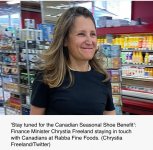I agree , beautiful and functional.I like your back yard. Great set up.
PS tobacco is sticky. Beautiful flowers.
It’s “Grocery Rebate” Day…July 5th, 2023
- Thread starter Ron in Regina
- Start date
You are using an out of date browser. It may not display this or other websites correctly.
You should upgrade or use an alternative browser.
You should upgrade or use an alternative browser.
Good idea to put Tobacco in a container otherwise the plants can get huge.
Killer shit for smoking too I knew one heavy smoker in Fiji-Ocker woman-who couldn't take the stuff at all.
Fijians cure it by putting it under the mattress between newspaper for a few weeks then making little rollies-they just take a hit and let it go out since it's so strong.
Killer shit for smoking too I knew one heavy smoker in Fiji-Ocker woman-who couldn't take the stuff at all.
Fijians cure it by putting it under the mattress between newspaper for a few weeks then making little rollies-they just take a hit and let it go out since it's so strong.
And if ya just stuff it in yer pocket, ya get lint and gunk in it when ya roll a smoke.Good idea to put Tobacco in a container otherwise the plants can get huge.
Beware of the bright red bugs that are killing lillies.The next crop of Lilies is ready to pop in the next day or two:
View attachment 18677
With one out since yesterday….
View attachment 18678
They wiped out my aunt's. She is Cathedral.
I'll post my garden later.
A Tuna only diet will cause you to be lightheaded, confused and disoriented. In other words, the way bill barilko posts is all starting to make sense.No Frills has canned Tuna On Sale for $0.99/per so I guess I'll buy a couple hundred of them
There is canned tuna and canned tuna . Big difference from solid white albacore and flaky light chunks .A Tuna only diet will cause you to be lightheaded, confused and disoriented. In other words, the way bill barilko posts is all starting to make sense.
Thank you. I had no idea you were a Tuna-ologist.There is canned tuna and canned tuna . Big difference from solid white albacore and flaky light chunks .
This week, the federal government will return a small portion of some Canadians’ hard-earned tax dollars to their bank accounts. The Liberals are calling the move a one-time “Grocery Rebate,” supposedly meant to make up for higher food prices caused by inflation.
However, in practice, the payment has no real connection to grocery prices or the soaring cost of living. It’s essentially a GST/HST credit top up, branded to make it look like the Liberals aren’t entirely tone deaf.

 apple.news
apple.news
This week, Finance Minister Chrystia Freeland went to a Rabba Fine Foods in Toronto to officially announce the launch of the Grocery Rebate, a one-time payout of as much as $500 to enable Canadians to buy groceries. The announcement had a somewhat celebratory air, which critics noted wasn’t a good thing since an incredible 11 million Canadians will meet the low-income criteria for the rebate.

Rest assured that if Canadians were ever to break faith with our leadership, a Poilievre-led government would not think twice of stripping Canadians of their rights to iodine or shoes.

 apple.news
apple.news

 apple.news
More than one quarter of Canadians received government payments this week to buy the most basic necessity, food. If anything speaks to a failure of the Liberal government to make life better for Canadians, it is that 11 million people, in a country of 40 million, received a grocery rebate payment.
apple.news
More than one quarter of Canadians received government payments this week to buy the most basic necessity, food. If anything speaks to a failure of the Liberal government to make life better for Canadians, it is that 11 million people, in a country of 40 million, received a grocery rebate payment.
It should be shocking to all that the government feels that 27.5% of the population is deemed in need of help to buy groceries. The figure is actually higher when you consider that many of those receiving the payments have children or other dependents.
“Inflation in Canada fell to 3.4 per cent in May — down from 4.4 per cent in April, and down from a high of 8.1 per cent last June,” Finance Minister Chrystia Freeland said while making her announcement of the grocery rebate Wednesday.
What Freeland didn’t mention was that while core inflation was down in May, Statistics Canada still shows that food inflation at 9% on average with some key items even higher. Cooking oils and edible fats were up 20.3%, bakery products were up 15% and cereal products up 13.6%.
To make matters worse, mortgage costs were up 29.9% in May compared to a year earlier.

 apple.news
apple.news
However, in practice, the payment has no real connection to grocery prices or the soaring cost of living. It’s essentially a GST/HST credit top up, branded to make it look like the Liberals aren’t entirely tone deaf.
Sabrina Maddeaux: 'Grocery Rebate' good for little more than Liberal party tweets — National Post
Most Canadians won’t be eligible for what little financial relief the rebate offers
This week, Finance Minister Chrystia Freeland went to a Rabba Fine Foods in Toronto to officially announce the launch of the Grocery Rebate, a one-time payout of as much as $500 to enable Canadians to buy groceries. The announcement had a somewhat celebratory air, which critics noted wasn’t a good thing since an incredible 11 million Canadians will meet the low-income criteria for the rebate.

Rest assured that if Canadians were ever to break faith with our leadership, a Poilievre-led government would not think twice of stripping Canadians of their rights to iodine or shoes.
'Think of all the hot dogs this grocery rebate buys': Inside the thoughts of Chrystia Freeland — National Post
Dear Diary: 'I know that the Grocery Rebate's one-time payment of $387 can be a transformative amount of money for a family in need'
CRA issuing one-time grocery rebate payments July 5 — CTV News
The Canada Revenue Agency will be issuing the long-promised 'grocery rebate' payments to eligible Canadians on July 5. The food-inflation focused affordability measure is set to roll out to approximately 11 million low- and modest-income Canadians. Here's how much money those eligible can expect...
It should be shocking to all that the government feels that 27.5% of the population is deemed in need of help to buy groceries. The figure is actually higher when you consider that many of those receiving the payments have children or other dependents.
What Freeland didn’t mention was that while core inflation was down in May, Statistics Canada still shows that food inflation at 9% on average with some key items even higher. Cooking oils and edible fats were up 20.3%, bakery products were up 15% and cereal products up 13.6%.
To make matters worse, mortgage costs were up 29.9% in May compared to a year earlier.
LILLEY: Trudeau's grocery rebate proof that his government is failing — Toronto Sun
More than a quarter of the Canadian population needing help to buy groceries is not a sign of success.
We're seniors & are not eligible either. I wish I didn't have mobility issues as I'd love to have my own garden. But hubby is an excellent shopper & does the flyer thing b4 going shopping but prices are still high no matter what one does.
Go at 8AM to get 50% off milk meat eggs bread and veg.We're seniors & are not eligible either. I wish I didn't have mobility issues as I'd love to have my own garden. But hubby is an excellent shopper & does the flyer thing b4 going shopping but prices are still high no matter what one does.
This week, the federal government will return a small portion of some Canadians’ hard-earned tax dollars to their bank accounts. The Liberals are calling the move a one-time “Grocery Rebate,” supposedly meant to make up for higher food prices caused by inflation.
However, in practice, the payment has no real connection to grocery prices or the soaring cost of living. It’s essentially a GST/HST credit top up, branded to make it look like the Liberals aren’t entirely tone deaf.

Sabrina Maddeaux: 'Grocery Rebate' good for little more than Liberal party tweets — National Post
Most Canadians won’t be eligible for what little financial relief the rebate offersapple.news
This week, Finance Minister Chrystia Freeland went to a Rabba Fine Foods in Toronto to officially announce the launch of the Grocery Rebate, a one-time payout of as much as $500 to enable Canadians to buy groceries. The announcement had a somewhat celebratory air, which critics noted wasn’t a good thing since an incredible 11 million Canadians will meet the low-income criteria for the rebate.
View attachment 18679
The worst party in my lifetime.
Absolute, out of touch, morons.
Day Lilies are coming in (just started today) now also:


These are….prolific. We’ve had to thin them out and give bunches away several several times already. They take a year or two to get established, but once they do you better like them!! Hell I keep them in check with the lawnmower.
They’re coming up on the other side of the fence in the neighbours lawn, so they just keep transplanting them into their flowerbeds….


These are….prolific. We’ve had to thin them out and give bunches away several several times already. They take a year or two to get established, but once they do you better like them!! Hell I keep them in check with the lawnmower.
They’re coming up on the other side of the fence in the neighbours lawn, so they just keep transplanting them into their flowerbeds….
If you wake up tomorrow with cool cretaceous fossils and exotic precambrian silicates on your front lawn...I had fuck all to do with it.Day Lilies are coming in (just started today) now also:
View attachment 18699
View attachment 18700
These are….prolific. We’ve had to thin them out and give bunches away several several times already. They take a year or two to get established, but once they do you better like them!! Hell I keep them in check with the lawnmower.
They’re coming up on the other side of the fence in the neighbours lawn, so they just keep transplanting them into their flowerbeds….
Youre right more than you realize. 3% on 15% over 3 years is a 6% rate average under BidenAccording to the Washington Post, inflation for June in the U.S. was down to 3%.
I blame Biden.






